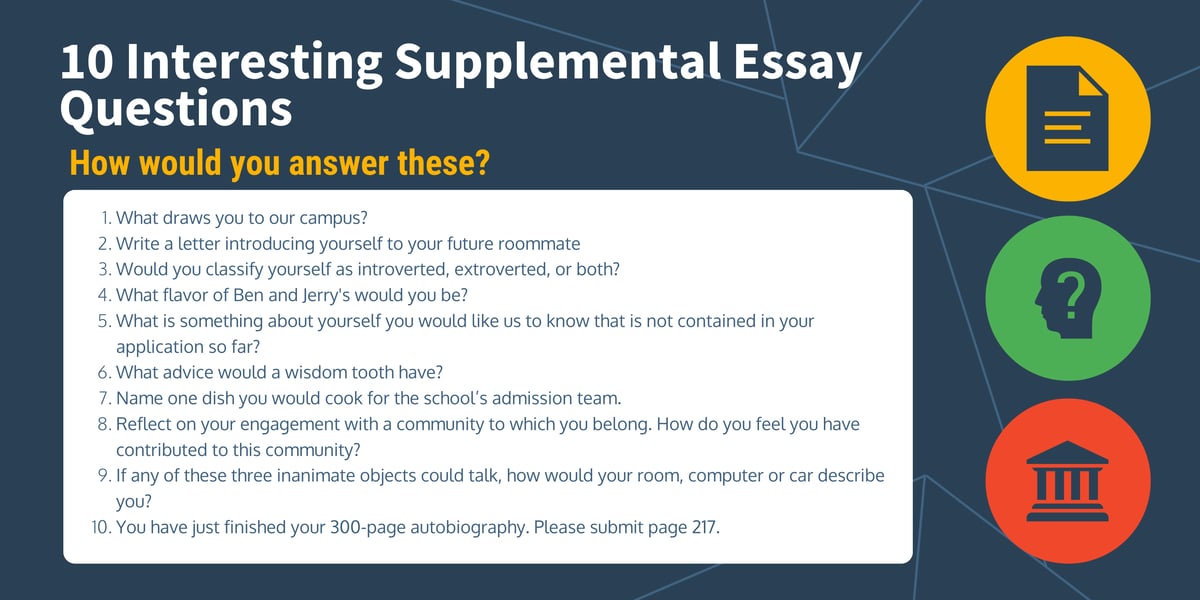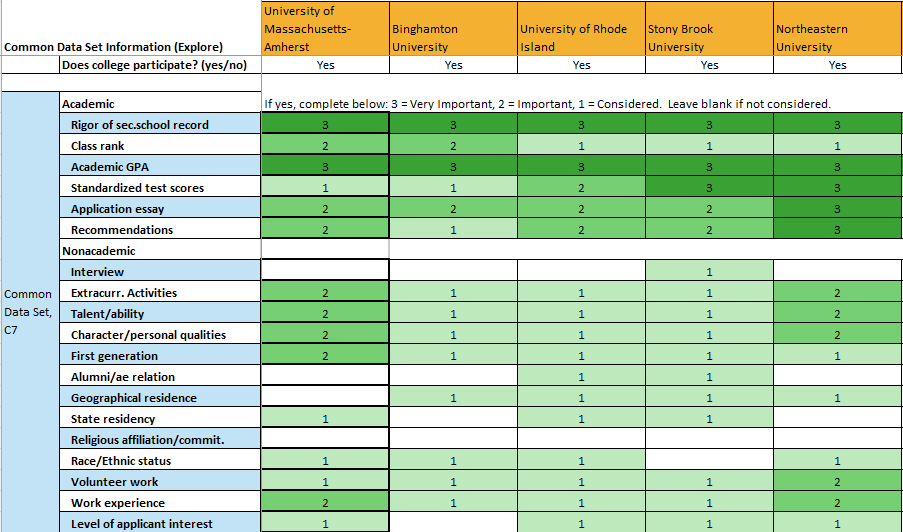Let’s talk about supplemental essays. Those extra essays colleges love to ask you to write up alongside your personal statement. These colleges do not simply ask for your personal statement; no, they also want you to answer an extra essay question or two that they’ve come up with. These essay prompts range from the normal (“Why do you want to come to our college?”) to the bizarre (“What color crayon would you describe yourself as?”).

No one wants to save their college applications for the last moment but it happens, not because a student is weak academically or poorly organized, but because students are often unaware of the amount of writing they must complete for their applications. It happens because students are unaware of the amount of writing they will have to complete for their applications.
If you’re wrapping up your junior year now, it is far too easy to assume you will not end up in this situation. Most students who scramble to finish their applications also thought they’d be done by the end of the previous summer or at least by November 1st.
While it might seem that students are to be blamed for that ignorance, I do not think that’s a fair characterization of the situation. The state of college applications has changed radically over the last decade. I can recall when college advising websites listed what schools asked for supplemental essays. Now, it’d be far shorter to list the schools that do not.
Often, but not always, the supplemental essays feature a smaller word count than the personal statement. That might sound like cause for celebration, but it can be misleading. If a school has two supplemental essays, then you could be dealing with a combined word count that exceeds the personal statement’s word count. There’s another level to this, too: if every college you apply to has a supplemental essay, or perhaps multiple essays, then you could be writing thousands of words before the process concludes.
As you read this, your stomach might be knotting up. Now, you fear you’ll be spending your every waking moment on college applications.
It’s understandable to be overwhelmed, but it’s not all bad news. Many of the supplemental essays are similar from college to college. You can devise a formula that works for you, one that answers the question and retains some of your writing style (do not have someone else write it from scratch for you: admissions advisors can likely tell). For example, many students settle on a formula to deal with questions on why they are applying to a certain school. You cannot use the same wording for two different colleges, but you can use the same structure. Still, this requires planning ahead of time.
The best time to plan? Summer vacation. List what schools you are going to apply to and record how many supplemental essays they require. Then, aim to tackle them in order of the due date. The schools with the earliest deadlines come first. Try to have the supplemental essays for a school completed at least a month before the application date. This gives you some breathing room. If you’re using Method Learning’s college application help, it also gives you plenty of time to ask us about any concerns.
Ideally, a student will have most of their college application work done by the end of the summer, but I recognize this is not possible for all applicants. Some are doing internships, others are working, some others are traveling. However, if it is at all possible to get it done by the end of the summer, then you should do so.
There are two great reasons to get those essays done by the conclusion of the summer. One, senior year is likely to be busy. Many students choose to take AP classes, which will keep them occupied with readings and essays. Then, there’s the social aspects of senior year, too: students are often more involved than ever in extracurricular activities at the conclusion of their high school career. They’ve likely risen to the top of the hierarchy in whatever clubs or sports they are involved in and have more responsibilities than they did in years past.
The second reason is that students tend to underestimate how long the writing process will take. I suspect most people reading this can recall a point where they became overwhelmed with an assignment that they thought would take two hours but ended up consuming eight hours of what was supposed to be a relaxing weekend binge watching some Netflix. I’ve talked with students who had so underestimated the time needed for applications that they even considered cutting down the schools they were applying to at the last minute (don’t worry: we always figured it out).
A natural question to have is if these essays are all that important. Can they be rushed without repercussions? While schools vary on how seriously they weigh the essays, if a college took the time to design a supplemental essay question, then it’s safe to assume they did so with a reason and are considering what the students write when making acceptance decisions. This goes doubly for anyone opting not to submit standardized test scores. No student should hope a school only considers the GPA score as colleges believe GPAs have been affected by online learning and, occasionally, by inconsistent grading from school district to school district. A look at the figure below shows how colleges rank the parts of the application in terms of importance. You can see some trends, but you can also spot how individual colleges have their own quirks.

As summer waits on the horizon, now is the time to start that application schedule, factoring in plenty of time for supplemental essays. Once scheduled, the application process can become far less stressful. I’ve seen it happen myself with students who organized efficiently and were done by September 1st. The new school year began with them waving goodbye to me after I gave them feedback on their final supplemental piece. They’re then able to enjoy senior year without a mountain of stress on their backs.
So, if you skipped everything above and came to this final paragraph, the answer to your supplemental essay concerns is this: set a schedule to get them done well ahead of time. This way, you can handle any issues that come up without having to panic. While there’s plenty more to talk about regarding structure, style, and dos and don’ts, the first thing to get a handle on is time management. After that, you’ll be able to tackle applications in a great state of mind.
Reprinted, with permission, from Methodize.






